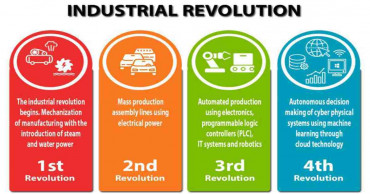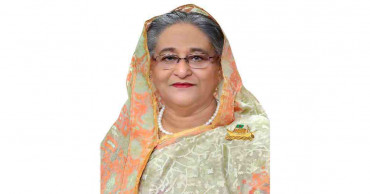Industrial Revolution
Bangladesh: On the frontline of a planet in peril
Nowhere is the climate crisis more pressing or more potentially catastrophic than Bangladesh, for the simple fact that nowhere else do we see a greater swathe of humanity under threat from its worst effects.
According to the Environmental Justice Foundation, by 2050, with a projected 50 cm rise in sea level, Bangladesh may lose approximately 11% of its land, affecting an estimated 15 million people living in its low-lying coastal region.
It isn’t something the country brought upon itself. As a late comer to industrialisation, the country’s contribution to anthropogenic climate change, for which the Industrial Revolution that started in 19th-century Britain was a catalyst, has actually been minimal.
That is why as the current chair of the Climate Vulnerable Forum, a group of 48 countries that are most disproportionately affected by the consequences of global warming, it is working hard for a fair and equitable deal to be reached at the next UN-led conference on the issue (COP26), set to be held in Glasgow in December.
Experts have long bemoaned the fact that the wealthier, industrialised countries – the ones who have historically contributed the most to the depletion of the ozone layer – still put up a reluctant front when it comes to taking responsibility now for addressing the problem.
“Bangladesh has been hit hard with extreme weather caused by climate change for years. Climate change is a global phenomenon that needs a global solution through collective efforts,” noted climate expert Dr Ainun Nishat on the occasion of World News Day.
Dr Nishat said they have been talking about climate finance for several decades for combating climate change impacts, but sufficient funds have not been allocated globally.
“It’s necessary to sensitise global leaders regarding climate financing and keep their commitment to reducing carbon emission. The upcoming COP-26 Summit will create an opportunity to do this,” he said.
World News Day is being observed in Bangladesh as elsewhere across the world today (Tuesday), highlighting the critical importance of credible journalism in providing trustworthy information about the climate crisis.
Environment experts said about 700,000 people in Bangladesh become refugees every year due to the natural disasters which are said to be intensifying with climate change.
They point out that per capita carbon dioxide (CO2) emission in Bangladesh is 0.46 tonne per year while it is about 10 to 15 tonnes per year in the developed countries.
Alongside reducing carbon emissions, the analysts said developed nations must help Bangladesh with mitigation and adaptation efforts, necessary funds, resources and technology to prepare it for the inevitable losses of lives, livelihoods, habitable land, and the resulting human migration.
Read: Dickson lauds Bangladesh's efforts on climate front
4 years ago
Microsoft helps 60,000-plus Bangladeshis gain digital skills amid Covid-19
Over 60,000 people in Bangladesh gained digital skills amid the pandemic with the support of Microsoft.
The company made the announcement in a media statement released on Thursday.
"From laid-off factory workers to retail associates and truck drivers, millions of people have turned to online learning courses from GitHub, LinkedIn, and Microsoft during the pandemic to help prepare for and secure the most in-demand roles, including customer service projects management and data analysis," it said.
Microsoft's announcement builds on the company's efforts to help people by extending free LinkedIn Learning and Microsoft Learn courses and low-cost certifications, that align to 10 of the most in-demand jobs, throughout 2021.
Also read: Microsoft server hack has victims hustling to stop intruders
The next stage of the initiative sets a new foundation for a skills-based economy through a suite of new tools and platforms designed to connect skilled job seekers with employers.
"The pandemic has changed everything, and the post-pandemic world will be a lot different than what we knew of it," said Afif Mohamed Ali, country managing director of Microsoft Bangladesh, Bhutan, Brunei, and Nepal.
"We are standing on the brink of the Fourth Industrial Revolution (4IR), which will fundamentally bring alchemical change and significantly impact all industries, including the job market It has become vital for individuals to learn and improve the skill set that will help them emerge stronger in the post-pandemic world."
"So, we have collaborated with LinkedIn to double our efforts to support the development of a more inclusive skill-based labour market, to create more alternatives, greater flexibility, and access learning paths to connect more people with new job opportunities," said Afif.
Also read: TikTok owner picks Oracle over Microsoft as US tech partner
LinkedIn plans to help 250,000 companies globally make skills-based hires this year through new and existing hiring products.
The company will provide both new ways for job seekers to demonstrate their skills and new tools for employers to connect to candidates based on their skill proficiencies including, LinkedIn Skills Path, LinkedIn profile features, and LinkedIn Skills Graph.
"More and more, we are seeing skills-based hiring becoming critical in our world of work. We've seen people across the globe express a desire to learn and build their skills, and organisations too, are hiring based on skills instead of traditional qualifications," said Olivier Legrand, managing director and vice-president of LinkedIn Asia Pacific and China.
"LinkedIn, together with Microsoft, are committed to helping everyone shift towards a skills-based economy. In 2021, we will continue our efforts to equip job seekers with the right resources to pick up new skills, and connect them to opportunities, as well as aim to help 250,000 organizations make a skills-based hire."
Read City Bank partners with Microsoft to enable its employees to work from home
4 years ago
Collective efforts needed to address challenges of 4IR
Planning Minister MA Mannan emphasised on collective efforts to use different tools for the Fourth Industrial Revolution (4IR) to address its challenges and harness its opportunities.
5 years ago
PM fears earth’s extinction, seeks steps to check human actions
Prime Minister Sheikh Hasina on Thursday said if the current actions of humans keep going on unchecked it will not only cause the extinction of other species, but also move towards ultimate extinction of itself.
5 years ago
.jpg)




